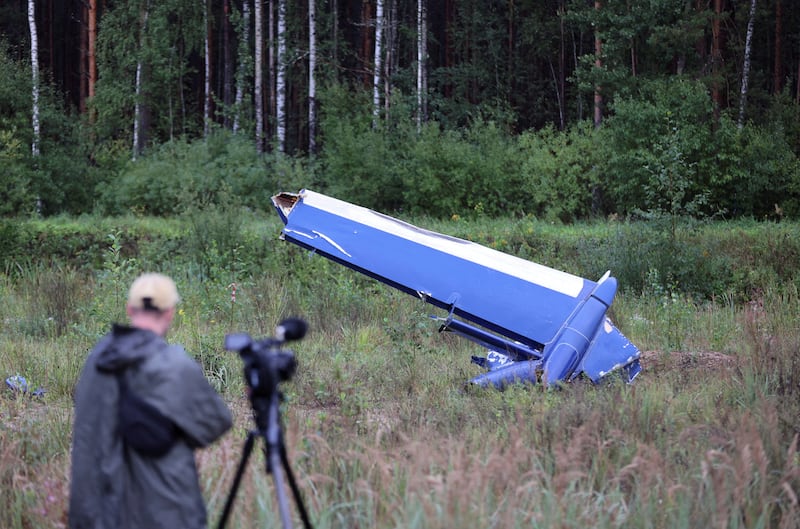On Wednesday, a private jet traveling from Moscow to St. Petersburg crashed a half-hour after take-off. Very quickly it was revealed that Wagner boss Yevgeny Prigozhin was listed on the passenger manifest. Simultaneously, social media footage of the crash showed an aircraft missing a wing falling out of the sky.
It seems increasingly likely that Prigozhin, Dmitry Utkin, the military commander of Wagner, and the top leadership of the Wagner group were eliminated in the crash. Most analysts believe the crash was the result of Vladimir Putin’s score-settling for Prigozhin’s June insurrection that briefly threatened the Putin regime. US officials told the Wall Street Journal Thursday that the crash was a result of an assassination plot, most likely a bomb aboard the plane.
The next few months following the Wagner insurrection and the elimination of Wagner and nationalist challengers will provide a window into whether the prospects to wind down the Russia-Ukraine war are viable without a decisive Ukrainian military victory. At minimum, we will quickly learn if Wagner has the capacity to seek retribution against Putin and his allies. Moreover, the death of Prigozhin will suppress other Putin challengers, and warn those that do come against Putin that if you come at the king, you best not miss.
It seems that Wagner is decapitated, but thousands of well-armed fighters remain in Russia, Africa, and Syria, with 6,000 fighters reportedly taking refuge in Belarus as part of Belarusian President and dictator Alexander Lukashenko’s brokered peace to end the insurrection.
Statements by Wagner mercenaries issued on social media channels indicate their intent to take revenge on those responsible for an attack on Prigozhin. The conditions seem ripe for more violence and Wagner reprisals. But with the Wagner leadership wiped out, the capacity of the private military company to threaten the Putin regime is dubious and greatly diminished. Within the Russian Ministry of Defense this is likely seen as a fitting end to Prigozhin and Wagner after Wagner forces shot down six aircraft and killed dozens of military personnel in their march on Moscow.
Prigozhin’s death likely buttresses Putin’s leadership. Prighozin has been seen by some analysts as a potential successor to Putin. While such a scenario was far-fetched, Putin didn’t miss the warm welcome that Prigozhin and Wagner fighters received in Rostov-on-Don during the insurrection, and the shows of support the mercenary boss enjoyed after it.

A cameraman films a wreckage of the private jet linked to Wagner mercenary chief Yevgeny Prigozhin near the crash site in the Tver region, Russia, August 24, 2023.
REUTERS/Marina LystsevaLike so many other people—journalists, opposition leaders, political opponents—Prigozhin after his failed insurrection was destined for prison or, more likely, a violent death. If the conclusion of the intelligence community does confirm that Prigozhin was murdered by Putin, it would not mean a change in tactics, or a significant departure from Putin’s past precedents—after all, he has murdered many opponents in his more than two decades in power. Instead, it signifies that the war has propelled Russia into a period of increased lawlessness and violence.
More important may be the implications of Prigozhin’s death for the Ukraine war. The reality might be that conditions have been set for more latitude for Putin to start negotiations and wind down the Russia-Ukraine conflict.
The elimination of Wagner after that of Surovikin, the hawk-general calling for a full mobilization and shift to war footing, and Igor Girkin, the nationalist firebrand responsible for the conduct of the Russia-Ukraine war in 2014, weakens the nationalist wing pushing for a more aggressive war—and may ease pressure on Putin for a continued, expanded war. This could open up the possibility of Russian negotiations to end the war later in the fall.
Putin has neutralized a key voice for the nationalist block attacking him for being weak on Ukraine, sent a message to other nationalist critics that he will not tolerate their criticism, and enabled a freedom of maneuver on a less hawkish approach to Ukraine.
While there is not a real shift away from Russia’s maximalist rhetoric for subduing Ukraine, and destroying it as a free independent state, the suppression of nationalist challengers may be followed by the testing of the possibility of negotiations when the results of Ukraine’s offensive are clear. By then, Putin could be on the horns of a dilemma: whether to conduct another mass mobilization that is internally destabilizing, or pursue negotiations that allow him the possibility of retaining Crimea and the areas of Donetsk and Luhansk occupied since 2014.
Russia’s willingness to negotiate may not end the war, as the Ukraine government is not likely to accept the continued occupation of large parts of Ukraine. But serious negotiations may present opportunities to reduce the violence against Ukraine outside of the front lines. And so, in some sense, the death of Prigozhin may accelerate the possibility of peace.







